A case represented by Guantao Hangzhou selected as one of 12 typical cases for application of international treaties and practice in foreign-related civil and commercial cases
On December 28, 2023, the Supreme People's Court issued a total of 12 typical cases for application of international treaties and practice in foreign-related civil and commercial cases. Shaphar Group LLC v. Baiqi Holdings (China) Co., Ltd. on disputes over contract for international sale of goods was selected as one of them. This case was represented by Lin Zichen, Guantao partner of the international investment and trade practice line, based in Hangzhou Office, under the guidance of Mr. Zou Jun, member of Guantao Management Committee. Guantao represented Shaphar Group demanding the refund of goods payment in the amount of USD 945000 and was finally supported by the court.
The typical significance of this case lies in that the application of international treaties shall prevail, and it serves as a model for accurately determining the effective time point of declaration of avoidance of a contract and reflects the comprehensiveness and accuracy of the application of international treaties by China's courts. We hereby share the above case with peers and the public for a practical reference.

Case II: Specifying the Application of International Treaties Shall Prevail, and Accurate Determination of the Effective Time Point of Declaration of Avoidance of a Contract
— —Shaphar Group LLC v. Baiqi Holdings (China) Co., Ltd. on disputes over contract for international sale of goods
[Basic Facts of the Case]
On April 3, 2020, Shaphar and Baiqi entered into a gloves sales contract, providing that Shaphar shall purchase gloves from Baiqi. Shaphar claimed that Baiqi committed defective payment, delayed payment and other breaches of contract, and sued to invalidate the contract, refund the payment for goods and interest thereon, and compensate for the losses caused by Baiqi's breach of contract.
[Result of the judgement]
Upon trial, Beijing No.4 Intermediate People's Court held that China and the United States, where the parties have their places of business, are contracting states of the United Nations Convention on Contracts for the International Sale of Goods, there was no inapplicability of the Convention in the case, and the parties had not excluded the application of the Convention, so the provisions of the Convention (except for the clauses that China has declared reservation) shall apply to the case. More than half of the goods delivered by Baiqi were defective with quality that failed to comply with the agreed quality, which are completely incompatible for the usual use of medical gloves of the same specification. Baiqi has not delivered part of the goods so far, which has significantly exceeded the time of delivery as agreed in the contract. The contract in question was signed during the period of Covid-19 pandemic, and Shaphar’s intention to sell gloves to customers in its country after purchasing them from our country was a business opportunity. However, Baiqi's breach of contract was sufficient to frustrate Shaphar's purpose of earning profits through the contract in this case, which constitutes a fundamental breach of contract. On May 20, 2021 Shaphar issued an attorney letter to Baiqi, notifying Baiqi of the termination of the Gloves Sales Contract. Although this letter was not received by Baiqi until May 22, 2021, the Convention adopted the “mailbox rule”, but not the “arrival test”, to determine when such notification took effect, and thus the Gloves Sales Contract in question became invalid as from the date when such notification letter was issued. Accordingly, it is ruled that the sales contract in dispute be declared null and void as of May 20, 2021, and Baiqi should refund to Shaphar the purchase payment of USD 945000, pay interest and compensate for the actual loss of USD 18882.12.
[Typical significance]
Rescission of a contract may invalidate the contract, break the existing transaction order and have material impact on the rights and obligations of both parties. Therefore, the United Nations Convention on Contracts for the International Sale of Goods has made corresponding provisions on the elements and time in exercising the declaration of avoidance of the contract while stipulating the system of declaring contracts invalid. CISG adopts different principles for the effectiveness of notice in Part Two of Contract and Part Three of Sale of Goods. The effectiveness, withdrawal or cancellation of an offer or acceptance shall be subject to the “arrival test”, that is, an offer or acceptance does not become effective until it has arrived at the other party. Article 27 of the Convention, notification of declaration of avoidance of the contract, states that the declaration of avoidance of the contract is effective if it is made "by means appropriate in the circumstances". The risk in the process of transmission is not assumed by the party entitled to termination. This is different from the "arrival test" prescribed in Article 565 of the Civil Code of the People's Republic of China. The United Nations Convention on Contracts for the International Sale of Goods has been accurately applied in this case. If an international treaty concluded by China has provisions different from those in the law of the People's Republic of China, the provisions of the international treaty shall prevail, which reflects the comprehensiveness and accuracy of the application of international treaties by Chinese courts and has a demonstration function for the hearing of such cases.